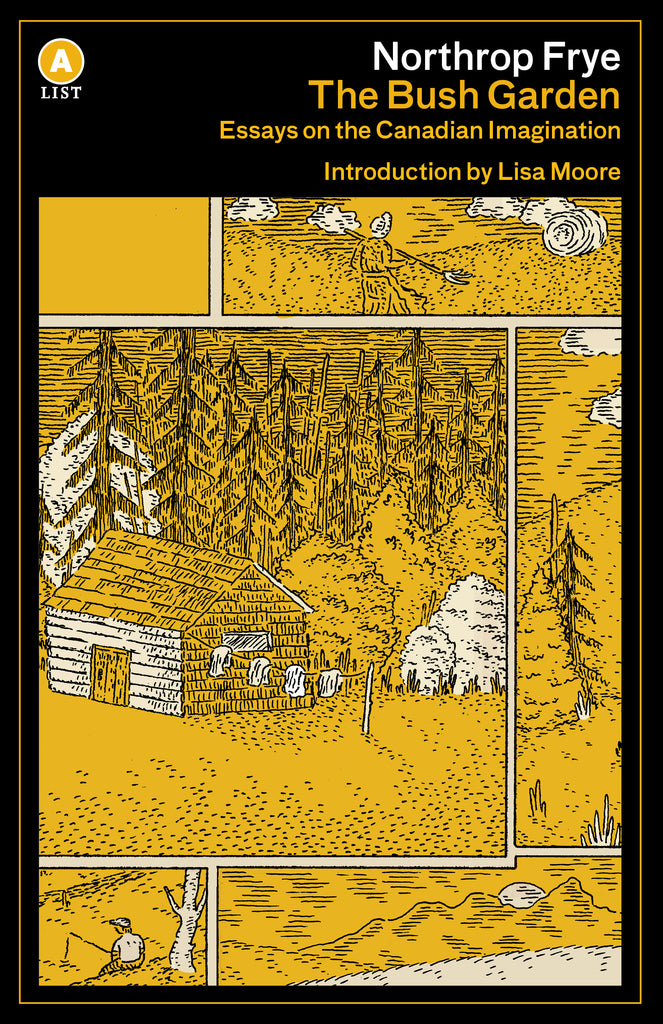Originally published in 1971,The Bush Garden features Northrop Frye’s timeless essays on Canadian literature and painting, and an introduction by bestselling author Lisa Moore.
In this cogent collection of essays written between 1943 and 1969, formidable literary critic and theorist Northrop Frye explores the Canadian imagination through the lens of the country’s artistic output: prose, poetry, and paintings. Frye offers insightful commentary on the works that shaped a “Canadian sensibility,” and includes a comprehensive survey of the landscape of Canadian poetry throughout the 1950s, including astute criticism of the work of E. J. Pratt, Robert Service, Irving Layton, and many others.
Written with clarity and precision,The Bush Garden is a significant cache of literary criticism that traces a pivotal moment in the country’s cultural history and the evolution of Frye’s thinking at various stages of his career. These essays are evidence of Frye’s brilliance, and cemented his reputation as Canada’s — and the world’s — foremost literary critic.
Originally published in 1971,The Bush Garden features Northrop Frye’s timeless essays on Canadian literature and painting, and an introduction by bestselling author Lisa Moore.
In this cogent collection of essays written between 1943 and 1969, formidable literary critic and theorist Northrop Frye explores the Canadian imagination through the lens of the country’s artistic output: prose, poetry, and paintings. Frye offers insightful commentary on the works that shaped a “Canadian sensibility,” and includes a comprehensive survey of the landscape of Canadian poetry throughout the 1950s, including astute criticism of the work of E. J. Pratt, Robert Service, Irving Layton, and many others.
Written with clarity and precision,The Bush Garden is a significant cache of literary criticism that traces a pivotal moment in the country’s cultural history and the evolution of Frye’s thinking at various stages of his career. These essays are evidence of Frye’s brilliance, and cemented his reputation as Canada’s — and the world’s — foremost literary critic.
| Published By | House of Anansi Press Inc — Aug 26, 2017 |
| Specifications | 272 pages | 5.5 in x 8.5 in |
| Keywords | essay collection; canadian art; literature; painting; poetry; academic critic; educated imagination; canada 150; canlit; art history; cultural studies; introduction; the northrop frye quote book; words with power; educating the imagination alan bewell; made for happiness jean vanier; george grant; critique; educational; collectors edition; |
|
Supporting Resources
(select item to download) |
Excerpt |
| Written By | Northrop Frye was one of our most distinguished and respected authorities on English literature. Prior to his death in 1991, he was principal and chancellor of Victoria College, University of Toronto, and a Fellow of the Royal Society of Canada. |
| Written By |
| Northrop Frye was one of our most distinguished and respected authorities on English literature. Prior to his death in 1991, he was principal and chancellor of Victoria College, University of Toronto, and a Fellow of the Royal Society of Canada. |
“Any publication by Northrop Frye is an important literary event; this one is of the highest importance to Canadian literature. Here Frye has collected all the essays he believes to be of permanent value on Canadian writing and painting. His tremendous intelligence and erudition is thus focused on a much smaller field of vision than it normally is. Tethered in its own backyard, as it were, this formidable creature can be observed more closely than it can be when it roams the far reaches of the literary world.” —Globe and Mail
“Frye’s handiwork is equivalent to most everyone’s masterwork. Nor can I imagine a more perceptive book being written about the Canadian poetic imagination. Northrop Frye resembles nobody so much as a poet Midas — everything he touches turns into poetic metaphor.” —Toronto Star
“These reviews are still relevant, partly because Frye is such a good critic and partly because his reviews embraced such a wide range of poetry that, perhaps especially in retrospect, they provide a fascinating sense of process through which a literature develops . . . We can respond to the immediate perceptions of a subtle and literate critical mind.” —Maclean’s
“Perhaps the most remarkable thing about The Bush Garden is that it reveals Northrop Frye as a practical critic. He does not try to fit everything he reads into preconceived theories, and the range of his sympathies is admirably wide. And he succeeds in demonstrating the importance for Canadian writers of their Canadian forebears.” —CBC Anthology

